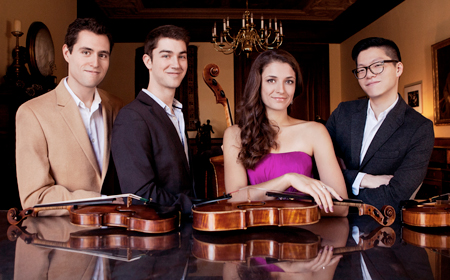by Nicholas Jones

The first piece on the program was new to me, and, I believe, to many in the audience. The prolific Polish-Soviet composer Mieczysław Weinberg has been overshadowed by the reputation of his friend and contemporary Dmitri Shostakovich. Weinberg’s String Quartet No. 8, Op. 66, dates from 1959, the same year as Shostakovich’s famous eighth quartet, and it deserves to be heard more often. This single-movement piece begins with a dreamlike, meditative opening motif that takes on a broader lyrical quality before launching into an agitated, almost frenetic intensity, followed by a brief return to the original mood. Weinberg writes with a strong sense of musical structure, and yet, as with Shostakovich, Weinberg’s music is never far from premonitions of disaster.
A more familiar piece followed the Weinberg, the second string quartet by the Czech composer Leoš Janáček. Written in 1928, the quartet is subtitled “Intimate Letters” — a heartfelt distillation of the aging Janáček’s complex emotional response to his love for a young married woman, Kamila Stösslová. Expansive and varied, this quartet is almost the direct opposite of what we might think of as the work of a composer in his final year of life: the music seems never content to rest, but constantly shifts in a passionate evolution of feeling.
The first movement begins with a big, modernist outburst of sound. A dance band appears from nowhere with its companionable rhythms. There’s a hymn somewhere in the soundscape, and we are treated to some gorgeous tunes for the viola. In all four movements, there is a similarly astonishing flexibility of style: episodes now tender, now anguished; tunes that metamorphose into accompaniment figures and then reappear with new intensity; a Viennese waltz that ends in sudden high drama. When Janáček heard the quartet played through for the first time only two months before his death, he was clearly struck by the romantic power of his own composition. Writing to Kamila, he called it “a work as if carved out of living flesh.”
Janáček would certainly have loved the Dover Quartet’s passionate and accomplished performance. The musicians, all excellent players, have developed an ensemble that serves them well in works as complex and, at times, as quirky as the Janáček. They display various styles of interaction — cellist Camden Shaw makes almost constant eye-contact with his colleagues, while second violinist Bryan Lee seems to connect in other ways, while concentrating on his music stand (all four played from iPads). The four have clearly developed a strong rapport with each other in their time together at the Curtis Institute of Music, and later at the Shepherd School of Music at Rice University.
First violinist Joel Link leads most entrances, but each member of the group takes responsibility as well. Janáček’s quartet gives particular prominence to the viola, which is said to represent the composer’s emotions. It’s a perfect piece for showcasing the commanding musical presence of the Dover’s superb violist, Milena Pajaro-van de Stadt.
The final piece was Robert Schumann’s A minor quartet (Op. 41, No. 1), written in 1842. Classically constructed (Schumann, like Brahms, was still resisting the Wagnerites and clinging to the older forms), the quartet packs familiar structures with energy and surprise — making it an inspired pairing with the Janáček.
The Dover brought a deeper, mellower tone to the Schumann than it had to the modernist-inflected Janáček, conveying in the Romantic work a profound sense of energy and joy, but with no hint of a shallow frivolity. A kind of personal drama seemed to underlie the progress of the usual four-movement structure, accompanied by a rhetoric of unflagging vitality. The quartet culminates in a final Presto with exhilarating melodic leaps, cascading scale passages, and dazzling fugue-like imitations.
After such Romantic fireworks, a quiet encore by Duke Ellington, played with plenty of swing, seemed just right to close a memorable concert.
Published on ClevelandClassical.com May 19, 2016.
Click here for a printable copy of this article


